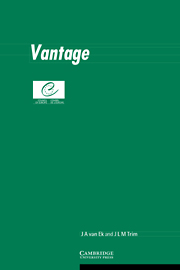Book contents
- Frontmatter
- Contents
- Introduction
- 1 The objective: levels of specificity
- 2 The objective: general characterisation
- 3 The objective: extended characterisation
- 4 The objective: components of the specification
- 5 Language functions
- 6 General notions
- 7 Topic-related tasks and lexicon
- 8 Discourse structure and verbal exchange
- 9 Dealing with texts: reading and listening
- 10 Writing
- 11 Sociocultural competence
- 12 Compensation strategies
- 13 Learning to learn
- 14 Degree of skill
- 15 By-products
- APPENDICES
7 - Topic-related tasks and lexicon
Published online by Cambridge University Press: 28 January 2010
- Frontmatter
- Contents
- Introduction
- 1 The objective: levels of specificity
- 2 The objective: general characterisation
- 3 The objective: extended characterisation
- 4 The objective: components of the specification
- 5 Language functions
- 6 General notions
- 7 Topic-related tasks and lexicon
- 8 Discourse structure and verbal exchange
- 9 Dealing with texts: reading and listening
- 10 Writing
- 11 Sociocultural competence
- 12 Compensation strategies
- 13 Learning to learn
- 14 Degree of skill
- 15 By-products
- APPENDICES
Summary
Introductory
It is a basic characteristic of the model used in the description of Waystage, Threshold and the present objective that the linguistic apparatus required by the learners is derived from what the learners have to be able to do in and with the foreign language. In order to make this derivation possible in a systematic manner, the categories of language functions and notions were set up, language functions denoting in a general way what people do by means of language and notions indicating the concepts that people handle while using language. We furthermore distinguish general notions and specific notions. General notions are those which a learner may need to handle whatever the situational context in which a communication act may take place and are largely concerned with abstract, relational concepts, whilst specific notions are those which deal with more concrete details of the here-and-now. They are likely to occur particularly in certain situational contexts and, more specifically, in relation to certain transactions and certain topics.
The consideration of how the various language functions are performed and how the general notions are expressed provides us with the systematic core of the linguistic apparatus required. General notions are concerned particularly – though not exclusively – with its grammatical component, including closed lexical-grammatical categories such as prepositions and conjunctions. The specific notions form the basis for determining the more concrete vocabulary that the learners may have to be familiar with.
- Type
- Chapter
- Information
- Vantage , pp. 72 - 79Publisher: Cambridge University PressPrint publication year: 2000



